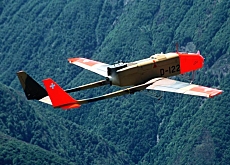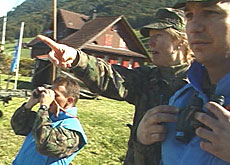Army drones keep an eye on the border

From January Swiss border guards will use small unmanned aircraft (drones) belonging to the army to monitor borders.
The drones are also being considered for use during the Euro 2008 football championships, which Switzerland and Austria are jointly hosting.
After successful test flights, Swiss border guards asked for permission to use the drones in the fight against smuggling and illegal immigration. The defence ministry has now approved this request.
However, Federal Data Protection Commissioner Hanspeter Thür criticised the lack of legal basis.
Thür said the defence ministry believed the customs law permitted the use of drones, but he explained that this law only applied to conventional surveillance techniques such as video cameras at unmanned borders.
Thür said the use of drones was a “new kind of surveillance” which could monitor a wide area from a great height and as such had nothing to do with watching borders.
“With this equipment you can also watch people inland simply going about their daily business,” he said.
But Thür said the defence ministry would at any rate stick to one of its guidelines: when the drone flights start in January they will only be observing – no recordings will be made.
For a definitive solution the Swiss government and parliament will be asked to come up with an explicit basis in the customs law.
In spring 2004 a debate about privacy was sparked after police busted two men smoking pot in a forest. They had been spotted by a drone and the army had alerted the police.
swissinfo with agencies
The drones, ADS 95 Rangers, are small unmanned exploratory aircraft equipped with cameras.
They are 4.6m long and have a 5.7m wingspan.
They are fired from a mobile ramp and guided from the ground up to a distance of 100km. They can reach speeds of more than 200km/h and an altitude of 4,500m.
Infrared cameras enable the drones to take photographs day and night.
The Swiss army has used these drones, which come from Israel, since 1999. It possesses 27, at a price of SFr2.5 million ($1.9 million) each.

In compliance with the JTI standards
More: SWI swissinfo.ch certified by the Journalism Trust Initiative











You can find an overview of ongoing debates with our journalists here . Please join us!
If you want to start a conversation about a topic raised in this article or want to report factual errors, email us at english@swissinfo.ch.